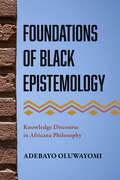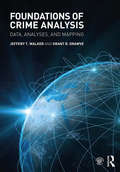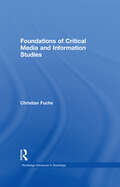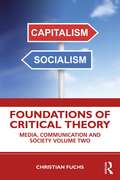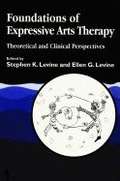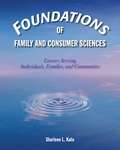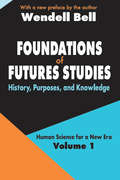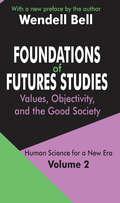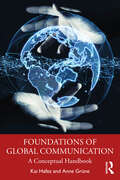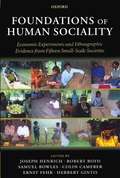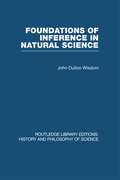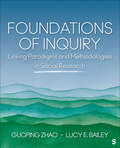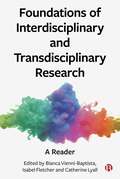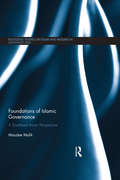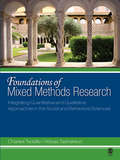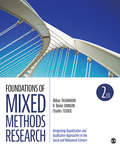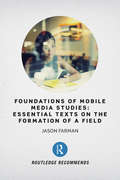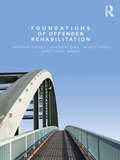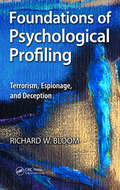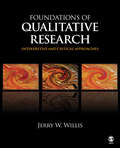- Table View
- List View
Foundations of Black Epistemology: Knowledge Discourse in Africana Philosophy
by Adebayo OluwayomiFoundations of Black Epistemology is Adebayo Oluwayomi’s bold endeavor to delineate Black epistemology as a new sub-disciplinary focus in contemporary Africana or Black philosophy. He engages in a rigorous historical study of Black intellectual history to show how seminal Black thinkers have long been interested in and engaged with questions concerning the phenomenon of human knowledge, and questions around human agency, including practical considerations regarding the social and political value of knowledge. Foundations of Black Epistemology examines writings by Phillis Wheatley, Frederick Douglas, Ida B. Wells, W.E.B. DuBois, Frantz Fanon, Steve Bantu Biko, Huey P. Newtown, and Kathleen Neal Clever. Each chapter addresses issues of self-knowledge, self-assertion, Black consciousness, or anticolonialism and its relation to personal and political epistemologies. Oluwayomi offers innovative perspectives on the formulation, deduction, and interrogation of epistemological themes within Black Africana philosophy. By considering the important epistemological theories and arguments in Black philosophy particularly in the last 150 to 200 years, Foundations of Black Epistemology promises to generate new discussions around this necessary field of Black Africana philosophy.
Foundations of Crime Analysis: Data, Analyses, and Mapping
by Jeffery T. Walker Grant R. DrawveIn recent years, the fields of crime analysis and environmental criminology have grown in prominence for their advancements made in understanding crime. This book offers a theoretical and methodological introduction to crime analysis, covering the main techniques used in the analysis of crime and the foundation of crime mapping. Coverage includes discussions of: The development of crime analysis and the profession of the crime analyst, The theoretical roots of crime analysis in environmental criminology, Pertinent statistical methods for crime analysis, Spatio-temporal applications of crime analysis, Crime mapping and the intersection of crime analysis and police work, Future directions for crime analysis. Packed with case studies and including examples of specific problems faced by crime analysts, this book offers the perfect introduction to the analysis and investigation of crime. It is essential reading for students taking courses on crime analysis, crime mapping, crime prevention, and environmental criminology. A companion website offers further resources for students, including flashcards and video and website links. For instructors, it includes chapter-by-chapter PowerPoint slides.
Foundations of Critical Media and Information Studies (Routledge Advances in Sociology)
by Christian FuchsFoundations of Critical Media and Information Studies lays down foundations for the analysis of media, information, and information technology in 21st century information society, as well as introducing the theoretical and empirical tools necessary for the critical study of media and information. Christian Fuchs shows the role classical critical theory can play for analyzing the information society and the information economy, as well as analyzing the role of the media and the information economy in economic development, the new imperialism, and the new economic crisis. The book critically discusses transformations of the Internet (‘web 2.0’), introduces the notion of alternative media as critical media, and shows the critical role media and information technology can play in contemporary society. This book provides an excellent introduction to the study of media, information technology, and information society, making it a valuable reference tool for both undergraduate and postgraduate students of subjects such as Media Studies, Sociology of Media, Social Theory, and New Media.
Foundations of Critical Theory: Media, Communication and Society Volume Two
by Christian FuchsThis second volume of Christian Fuchs’ Media, Communication and Society book series outlines key concepts and contemporary debates in critical theory. The book explores the foundations of a Marxist-humanist critical theory of society, clarifying and updating key concepts in critical theory – such as the dialectic, critique, alienation, class, capitalism, ideology, and racial capitalism. In doing so, the book engages with and further develops elements from the works of Karl Marx, Friedrich Engels, Rosa Luxemburg, Max Horkheimer, Theodor W. Adorno, Herbert Marcuse, David Harvey, Michael Hardt, Antonio Negri, C.L.R. James, Adolph L. Reed Jr., and Cornel West. Written for a broad audience of students and scholars, this book is an essential guide for readers who are interested in how to think critically from perspectives such as media and communication studies, sociology, philosophy, political economy, and political science.
Foundations of Expressive Arts Therapy: Theoretical and Clinical Perspectives
by Stephen K. Levine Ellen G. LevineThe book explores the various expressive arts therapy modalities both individually and in relationship to each other. The contributors emphasize the importance of the imagination and of aesthetic experience, arguing that these are central to psychological well-being, and challenging accepted views which place primary emphasis on the cognitive and emotional dimensions of mental health and development.
Foundations of Family and Consumer Sciences: Careers Serving Individuals, Families, and Communities
by Sharleen Gay KatoFoundations of Family and Consumer Sciences is a college-level textbook designed to introduce students to the family and consumer sciences profession. An overview of the profession, including history and trends is presented. Career opportunities for each family and consumer sciences specialization area are explored and come to life in Professional Profiles and Issues in the News features. The text guides students in how to move into the workplace and how to make a difference in the lives of others.
Foundations of Futures Studies: Volume 1: History, Purposes, and Knowledge (Human Science For A New Era Ser.)
by Jose ValciukasFutures studies is a new field of inquiry involving systematic and explicit thinking about alternative futures. It aims to demystify the future, make possibilities for the future more known to us, and increase human control over the future. This book summarizes and expands contributions of futurists to the envisioning power and well-being of humanity. Bell brings together futurist intellectual tools, describing and explaining not only the methods, but also the nature, concepts, theories, and exemplars of the field.Foundations of Futures Studies fulfills Bell's five main purposes for writing this two-volume effort: (1) to show that futures studies, like other fields from anthropology to zoology, exists as an identifiable sphere of intellectual activity; (2) to create a teaching instrument that can be used as a basic text for core courses in futures studies; (3) to futurize the thinking of specialists in other disciplines; (4) to contribute to the further development and improvement of futures studies; and (5) to provide tools to empower both ordinary people and leaders to act in ways that create better futures for themselves and their societies. Bell maintains that despite its sometimes doomsday rhetorical style and widespread use by special interests, futures studies offers hope for the future of humanity and concrete ways of realizing that hope in the real world of our everyday lives. It will appeal to all interested in futures studies, as well as sociologists, economists, political scientists, and historians.
Foundations of Futures Studies: Volume 2: Values, Objectivity, and the Good Society
by Wendell BellFutures studies is a new field of inquiry involving systematic and explicit thinking about alternative futures. Wendell Bell's two-volume work Foundations of Futures Studies is widely acknowledged as the fundamental work on the subject. In Volume 2, Bell goes beyond possible and probable futures to the study of preferable futures. He shows that concern with ethics, morality, and human values follows directly from the futurist purposes of discovering or inventing, examining, and proposing desirable futures. He examines moral judgments as an inescapable aspect of all decision-making and conscious action, even in the everyday lives of ordinary people.Now available in paperback with a new preface from the author, Volume 2 of Foundations of Futures Studies moves beyond cultural relativism to critical evaluation. Bell compares depictions of the good society by utopian writers, describes objective methods of moral judgment, assesses religion and law as sources of what is morally right, documents the existence of universal human values, and shows that if human beings are to thrive in the global society of the future, some human values must be changed.
Foundations of Global Communication: A Conceptual Handbook
by Kai Hafez Anne GrüneThis book provides a wide-ranging theoretical and empirical overview of the disparate achievements and shortcomings of global communication. This exceptionally ambitious and systematic project takes a critical perspective on the globalization of communication. Uniquely, it sets media globalization alongside a plethora of other globalized forms of communication, ranging from the individual to groups, civil society groupings, commercial enterprises and political formations. The result is a sophisticated and impressive overview of globalized communication across various facets, assessing the phenomena for the extent to which they live up to the much-hyped claims of globalization’s potential to create a globally interdependent society. The setbacks of globalization, such as right-wing populism and religious fundamentalism, can only be understood if the shortcomings of global communication are taken more seriously. Covering all types of cross-border global communication in media, political and economic systems, civil societies, social media and lifeworlds of the individual, this unique book is invaluable for students and researchers in media, communication, globalization and related areas.
Foundations of Human Sociality: Economic Experiments and Ethnographic Evidence from Fifteen Small-Scale Societies
by Robert Boyd Samuel Bowles Herbert Gintis Joseph Henrich Colin Camerer Ernst FehrThis path-breaking book addresses the nature of human sociality. By bringing together experimental and ethnographic data from fifteen different tribal societies, the contributors are able to explore the universality of human motives in economic decision-making, and the importance of social, institutional and cultural factors, in a manner that has been extremely rare in the social sciences. Its findings have far-reaching implications across the social sciences.
Foundations of Inference in Natural Science (Routledge Library Editions: History & Philosophy of Science)
by John Oulton WisdomOriginally published in 1952. This book is a critical survey of the views of scientific inference that have been developed since the end of World War I. It contains some detailed exposition of ideas – notably of Keynes – that were cryptically put forward, often quoted, but nowhere explained. Part I discusses and illustrates the method of hypothesis. Part II concerns induction. Part III considers aspects of the theory of probability that seem to bear on the problem of induction and Part IV outlines the shape of this problem and its solution take if transformed by the present approach.
Foundations of Inquiry: Linking Paradigms and Methodologies in Social Research
by Guoping Zhao Lucy E. BaileyWhen researchers adopt a methodology, they bring to their research the theoretical assumptions infused within that methodology, and the paradigm that shapes that methodology describes their view of social life. This book is about paradigms and how they connect to methodologies. The authors explore a rich body of paradigms and how they support different methodologies and connect to designing and carrying out research. The book includes clear explanations of complex material, a thorough development of established paradigms and discussion of contemporary ones such as general interpretivism, critical race theory, and Indigenous orientations. The book′s pedagogy includes examples of published research, discussion of the issues related to each paradigm and the connections between them, and review questions and prompts to help deepen understanding.
Foundations of Inquiry: Linking Paradigms and Methodologies in Social Research
by Guoping Zhao Lucy E. BaileyWhen researchers adopt a methodology, they bring to their research the theoretical assumptions infused within that methodology, and the paradigm that shapes that methodology describes their view of social life. This book is about paradigms and how they connect to methodologies. The authors explore a rich body of paradigms and how they support different methodologies and connect to designing and carrying out research. The book includes clear explanations of complex material, a thorough development of established paradigms and discussion of contemporary ones such as general interpretivism, critical race theory, and Indigenous orientations. The book′s pedagogy includes examples of published research, discussion of the issues related to each paradigm and the connections between them, and review questions and prompts to help deepen understanding.
Foundations of Interdisciplinary and Transdisciplinary Research: A Reader
by Catherine Lyall Bianca Vienni-Baptista Isabel FletcherIntroduction chapter is available Open Access under CC-BY-NC-ND licence. This groundbreaking reader is designed to lower the barriers to interdisciplinarity and transdisciplinarity in research. Edited by experienced researchers from a range of different fields, it paves the way for future scholarship and effective research collaborations across disciplines. Chapters offer extracts from key academic texts on topics such as the design, funding, evaluation and communication of research, providing those new to the field with a thorough grounding. They highlight examples of interdisciplinary and transdisciplinary triumphs – and challenges. Concluding each chapter is a commentary provided by practitioners from diverse backgrounds, many of whom are themselves developing new approaches to inter- and transdisciplinarity. The book is: • the first ever comprehensive reader for interdisciplinarity and transdisciplinarity; • essential reading for those seeking to become effective collaborative researchers; • complete with concise introductions, extracts, commentary and further reading in each chapter. This is a much-needed primer that improves our understanding of the characteristics of interdisciplinarity and transdisciplinarity, unlocking their exciting potential in research and teaching within and beyond academia.
Foundations of Interpersonal Practice in Social Work: Promoting Competence in Generalist Practice
by Charles D. Garvin Brett A. Seabury Barbara SeaburyThis text takes a broad based approach to basic generalist practice methods that emphasize the common elements in working with individuals, families and groups. The goal of the book is to teach social work students how to enhance clients′ social functioning by helping them become more proficient in examining, understanding, and resolving clients′ social problems. The authors pay special attention to enhancing social justice by working with individuals and families who have been historically oppressed. This edition includes specific integrated coverage of the Council on Social Work Education′s (CSWE) latest Educational Policy and Accreditation Standards (EPAS).Intended Audience This core text is designed for advanced undergraduate and graduate students enrolled in the introductory Direct Practice and Generalist Practice courses in BSW and MSW programs of social work.
Foundations of Islamic Governance: A Southeast Asian Perspective (Routledge Studies on Islam and Muslims in Southeast Asia)
by Maszlee MalikThe aim of this book is to explore and analyze the Islamic axioms, foundation principles and values underpinning the field of governance in an attempt to construct the architectonics of a new systemic and dynamic theory and formulate the articulation of ‘Islamic governance’. This discursive and abstract, rather than being an empirical exercise, assumes to produce a ‘good governance’ framework within its own formulation through a value-shaped dynamic model according to maqasid al-Shari’ah (higher objective of Shari’ah) by going beyond the narrow remit of classical and contemporary discussions produced on the topic, which propose a certain institutional model of governance based on the classical juristic (fiqh) method. Through an exclusive analytical discursive approach in this book, readers will find that Islam as one of the major religions in the contemporary world with the claim of promising the underpinning principles and philosophical foundations of worldly affairs and institutions through a micro method of producing homoIslamicus could contribute towards development of societies by establishing a unique model of governance from its explicit ontological worldview through a directed descriptive epistemology.
Foundations of Mixed Methods Research: Integrating Quantitative and Qualitative Approaches in the Social and Behavioral Sciences
by Charles B. Teddlie Abbas M. TashakkoriFoundations of Mixed Methods Research is the first comprehensive textbook on using mixed methods in the social sciences, written by two leading names in the field. Mixed methodology (combining quantitative and qualitative approaches) has become an increasingly popular way of both researching and teaching methodology across the social sciences, and students across these fields are expected to be proficient in both quantitative and qualitative techniques. This text begins with an introduction to and overview of the development of mixed methodology, and then takes students through all aspects of working with mixed methods from research design and data collection through to analysis and conclusions.
Foundations of Mixed Methods Research: Integrating Quantitative and Qualitative Approaches in the Social and Behavioral Sciences
by Charles B. Teddlie Abbas M. Tashakkori Robert Burke JohnsonThe highly-anticipated second edition of the Foundations of Mixed Methods Research:Integrating Quantitative and Qualitative Approaches in the Social and Behavioral Sciences gives students a comprehensive overview of mixed methods from philosophical roots and traditions through designing, conducting, and disseminating a study. Authors Abbas Tashakkori, R. Burke Johnson, and Charles Teddlie have thoroughly updated the text to reflect the many advances over the last decade in mixed methods. New example studies throughout and a new appendix highlight the latest research on mixed methods and current best practices. New sections on evaluating quality in mixed methods studies and writing up research results round out the process of mixed methods research. The authors have added features like content summaries and objectives at the beginning of each chapter and chapter summaries and previews at the end of each chapter aid readers in their mixed methods journey. Students across social science, behavioral science, and health and nursing fields are now expected to be proficient in mixed methods research. This text begins with an introduction to and overview of the development of mixed methodology, and then takes students through all aspects of working with mixed methods, from research design and data collection through to analysis and conclusions. This new edition includes additional information on writing, publishing, and disseminating results, as well as information on policy impact and annotated examplars of mixed methods research studies. A new generation of mixed methods scholars can now engage with this vital text in mixed methods research.
Foundations of Mixed Methods Research: Integrating Quantitative and Qualitative Approaches in the Social and Behavioral Sciences
by Charles B. Teddlie Abbas M. Tashakkori Robert Burke JohnsonThe highly-anticipated second edition of the Foundations of Mixed Methods Research:Integrating Quantitative and Qualitative Approaches in the Social and Behavioral Sciences gives students a comprehensive overview of mixed methods from philosophical roots and traditions through designing, conducting, and disseminating a study. Authors Abbas Tashakkori, R. Burke Johnson, and Charles Teddlie have thoroughly updated the text to reflect the many advances over the last decade in mixed methods. New example studies throughout and a new appendix highlight the latest research on mixed methods and current best practices. New sections on evaluating quality in mixed methods studies and writing up research results round out the process of mixed methods research. The authors have added features like content summaries and objectives at the beginning of each chapter and chapter summaries and previews at the end of each chapter aid readers in their mixed methods journey. Students across social science, behavioral science, and health and nursing fields are now expected to be proficient in mixed methods research. This text begins with an introduction to and overview of the development of mixed methodology, and then takes students through all aspects of working with mixed methods, from research design and data collection through to analysis and conclusions. This new edition includes additional information on writing, publishing, and disseminating results, as well as information on policy impact and annotated examplars of mixed methods research studies. A new generation of mixed methods scholars can now engage with this vital text in mixed methods research.
Foundations of Mobile Media Studies: Essential Texts on the Formation of a Field (Routledge Recommends)
by Jason FarmanFoundations of Mobile Media Studies gathers some of the most important texts in this emerging field, offering readers key approaches to understanding our moment and our media. The impact of mobile media is far reaching and this book discusses topics such as human intimacy, social space, political uprisings, labor, mobile phones in the developing world, gender, the mobile device’s impact on reading, mobile television, and mobile photography, among others. This carefully curated collection will serve as the central text to introduce this field to anyone eager to understand the rise of mobile technology, its impact on our relationships, and how these media have transformed the ways we understand the world around us.
Foundations of Offender Rehabilitation
by Tony Ward Andrew Day Sharon Casey Jim VessThe past three decades has seen dramatic changes in the way in which the criminal justice system responds to those who break the law. The old claim in the field of correctional psychology that "nothing works" has strongly been refuted in the face of evidence from rehabilitation programmes that do make a difference. The graduate student in forensic psychology could easily be overwhelmed by the plethora of information now available. This new textbook offers a comprehensive approach to forensic and correctional psychology, demonstrating how theory and practise can be applied and integrated. Written by intentionally recognized experts within the field, the authors guide the students through the core theories and concepts that underpin forensic practise within the legal systems of different countries (UK, USA, Canada, Australia and Singapore), show how this knowledge informs current thinking in offender rehabilitation and reintegration and provide a series of case studies looking at sexual offenders, female offender, juveniles and offenders with mental disorders. This book is the perfect overview for graduate students of forensic and correctional psychology engaged with offender rehabilitation and assessment and the psychology of law.
Foundations of Orientation and Mobility (2nd Edition)
by Bruce B. Blasch William R. Wiener Richard L. WelshA text for specialists in orientation and mobility, providing background information on physiology and function of human perceptual and motor systems. A section on human systems addresses areas including low vision, kinesiology, and sensorimotor function, and a section on mobility systems deals with tools, materials, and techniques such as canes, electronic travel aids, trained dogs, and changes in the built environment that facilitate travel for blind people. A section on the learner focuses on approaches for teaching children, adults, and those with multiple impairments. A final section reviews development of the profession from the post WWII-era to the present, and looks at future trends. Includes bandw photos and learning activities. This edition incorporates changes in the field since 1980. Annotation copyrighted by Book News, Inc. , Portland, OR
Foundations of Psychological Profiling: Terrorism, Espionage, and Deception
by Richard BloomProfiling is a hot topic today. The post-9/11 "War on Terrorism" has engendered political, ethical, and scientific controversy over its use. The proliferation of recent films, television programs, and books is a sociocultural indicator of widespread interest. Designed for a diverse audience including law enforcement officers, intelligence and secur
Foundations of Qualitative Research: Interpretive and Critical Approaches
by Jerry W. WillisFoundations of Qualitative Research introduces key theoretical and epistemological concepts replete with historical and current real-world examples. Author Jerry W. Willis provides an invaluable resource to guide the critical and qualitative inquiry process written in an accessible and non-intimidating style that brings these otherwise difficult concepts to life.
Foundations of Qualitative Research: Interpretive and Critical Approaches
by Jerry W. WillisFoundations of Qualitative Research introduces key theoretical and epistemological concepts replete with historical and current real-world examples. Author Jerry W. Willis provides an invaluable resource to guide the critical and qualitative inquiry process written in an accessible and non-intimidating style that brings these otherwise difficult concepts to life.
